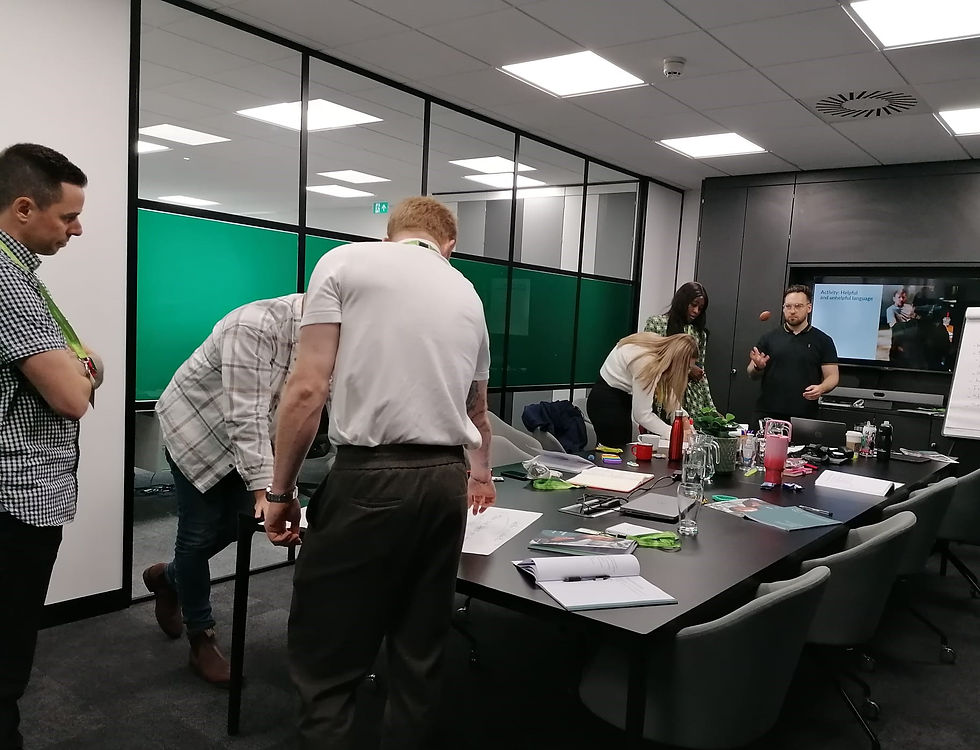Beyond the Surface: Challenging Common Mental Health Misconceptions in the Workplace
- fabydoano
- Jul 4, 2025
- 3 min read

Apoyo Courses creates welcoming spaces so people can speak freely and honestly. When it comes to mental health in the workplace, there are often more challenges and misconceptions than meet the eye. These hidden obstacles prevent individuals from seeking support and make it difficult for organisations to develop a mentally healthy environment.
Let's shed light on some of the most common myths and realities surrounding mental health at work:
Myth 1: "Mental health issues are rare, and they won't affect my team."
Reality: This couldn't be further from the truth. Mental health challenges are incredibly common. Statistics consistently show that a significant percentage of the UK workforce will experience a mental health problem in any given year. Issues like anxiety, depression, and stress are widespread and can affect anyone, regardless of their role or seniority. Ignoring this reality means missing opportunities to support your team and, ultimately, impacting productivity, morale, and retention.
Myth 2: "Mental health is a personal issue; it shouldn't be brought into the workplace."
Reality: While mental health is deeply personal, it doesn't exist in a vacuum. Our work lives significantly impact our overall wellbeing, and equally, our mental health profoundly affects our ability to perform at work. Poor communication, heavy workloads, lack of control, and toxic cultures are just a few workplace factors that can exacerbate or even trigger mental health issues. A supportive workplace recognises how these things are related and understands that investing in employee mental health helps the whole organisation succeed
Myth 3: "Talking about mental health will make things worse or open a 'can of worms'."
Reality: This fear often comes from feeling unsure or not knowing what to say. However, the opposite is true. Openly discussing mental health reduces stigma and creates a safe space for people to seek help. When organisations encourage these conversations, they empower individuals, build trust, and enable early intervention. Suppressing conversations only pushes struggles underground, often leading to more severe issues down the line, like increased absenteeism, presenteeism, and burnout.
Myth 4: "Someone struggling with their mental health can't be a productive employee."
Reality: A mental health condition doesn't define a person's capability. Many individuals manage their mental health effectively and continue to be highly productive and valuable members of a team. With the right support and reasonable adjustments - which can often be simple and low-cost – employees can succeed. The misconception that mental health struggles mean someone is professionally incompetent is a form of discrimination that costs organisations talented individuals and diverse perspectives.
Myth 5: "Mental health support is just about offering an Employee Assistance Programme (EAP)."
Reality: While EAPs can be a valuable resource, they are only one piece of the puzzle. A mentally healthy workplace requires a holistic approach. This includes:
Proactive measures: Training managers to spot signs, promoting a positive work-life
balance, and promoting psychological safety.
Early intervention: Encouraging open dialogue and providing avenues for support before a crisis hits.
Reasonable adjustments: Being flexible and accommodating individual needs.
Leadership buy-in: Leaders openly championing mental wellbeing and modelling healthy behaviours.

The Apoyo Difference: Rooted in Care
At Apoyo Courses, we don't just teach theory; we facilitate genuine understanding and practical application. Fabiola's lived experience, combined with our compassionate and culturally sensitive approach, means our training goes beyond simply debunking myths. We equip individuals and organisations with the skills and confidence to:
Recognise the signs: Understand the indicators of mental health challenges in themselves and others.
Break down barriers: Challenge internal and external stigma.
Encourage connection: Create environments where people feel seen, heard, and supported
Act with confidence: Provide practical strategies for meaningful intervention and support.
Meaningful change starts with honest conversations and human connection. By addressing these common misconceptions, we can build workplaces where mental health is prioritised, respected, and championed, creating a positive impact for everyone.
Ready to transform your workplace culture? Contact Apoyo Courses today to learn how our inclusive training can make a lasting difference.
Train with us!!
Your Partner in Positive Change
At Apoyo Courses, we believe that understanding is the first step towards transformation. Our approach, rooted in Fabiola's rich experience and cultural awareness, helps organisations like yours move beyond misconceptions to create environments where everyone feels valued and understood.
Our Mental Health, Anti-Racism, and DEI courses are designed to spark genuine conversations and deliver lasting impact. They empower your team to build a kinder, more inclusive, and mentally healthier world, one conversation at a time.
Ready to start that conversation in your organisation? Get in touch with Apoyo Courses today.



Comments